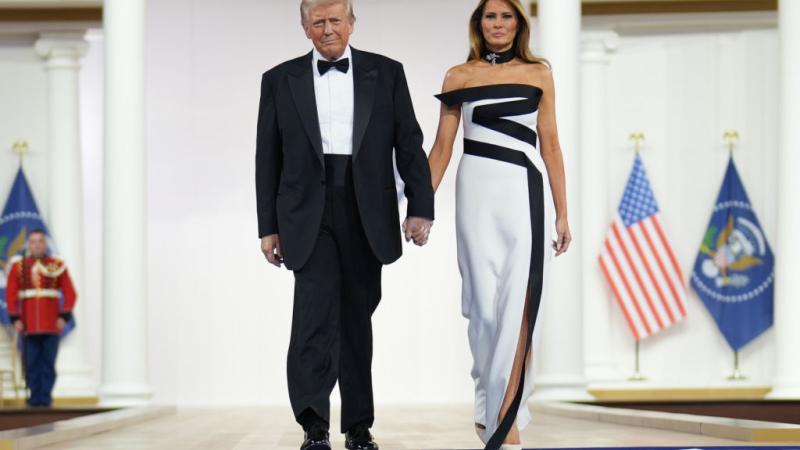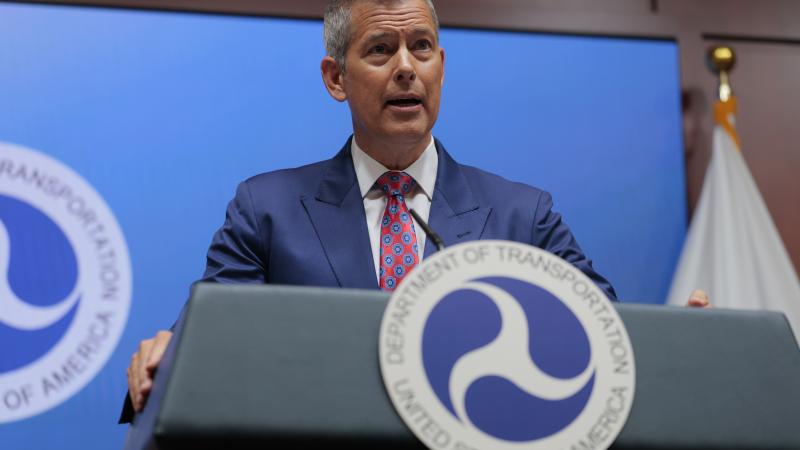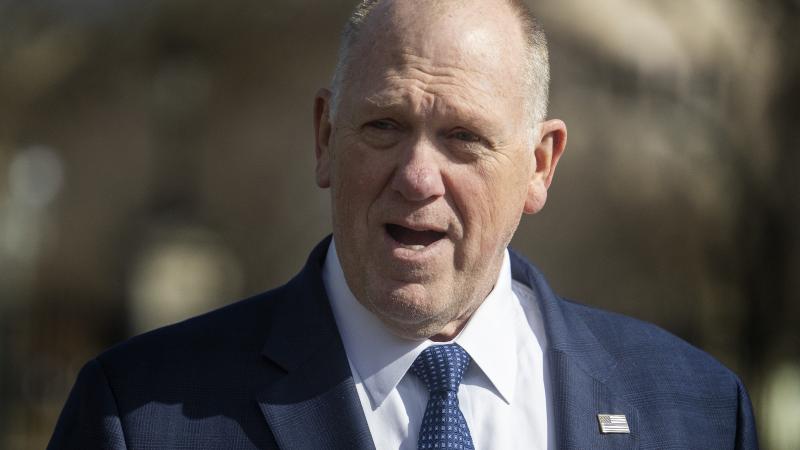Trump's Senate trial: What you need to know
The charge, the players, the arguments, the judge, the timetable — and the outcome.
Judgment Day has arrived.
Former President Donald Trump goes on trial Tuesday in the Senate. He was impeached last month by the House. Here's what you need to know:
The Charge
Excerpts from the House impeachment resolution:
"The Constitution provides that the House of Representatives 'shall have the sole Power of Impeachment' and that the President 'shall be removed from Office on Impeachment for, and Conviction of, Treason, Bribery, or other high Crimes and Misdemeanors,'" says the single article of impeachment."Further, section 3 of the 14th Amendment to the Constitution prohibits any person who has 'engaged in insurrection or rebellion against' the United States from 'hold[ing] any office ... under the United States.' In his conduct while President of the United States — and in violation of his constitutional oath faithfully to execute the office of President of the United States and, to the best of his ability, preserve, protect, and defend the Constitution of the United States, and in violation of his constitutional duty to take care that the laws be faithfully executed — Donald John Trump engaged in high Crimes and Misdemeanors by inciting violence against the Government of the United States ...
"In all this, President Trump gravely endangered the security of the United States and its institutions of Government. He threatened the integrity of the democratic system, interfered with the peaceful transition of power, and imperiled a coequal branch of Government. He thereby betrayed his trust as President, to the manifest injury of the people of the United States.
"Wherefore, Donald John Trump, by such conduct, has demonstrated that he will remain a threat to national security, democracy, and the Constitution if allowed to remain in office, and has acted in a manner grossly incompatible with self-governance and the rule of law. Donald John Trump thus warrants impeachment and trial, removal from office, and disqualification to hold and enjoy any office of honor, trust, or profit under the United States."
Read the full text here.
Players
The Prosecution
On Jan. 12, House Speaker Nancy Pelosi named nine impeachment managers. "It is their constitutional and patriotic duty to present the case for the President's impeachment and removal," Pelosi said. "They will do so guided by their great love of country, determination to protect our democracy and loyalty to our oath to the Constitution. Our Managers will honor their duty to defend democracy For The People with great solemnity, prayerfulness and urgency.
The Impeachment Managers:
- Rep. Jamie Raskin will serve as lead manager. Raskin represents Maryland and serves as a member of the Judiciary Committee. He was a professor of constitutional law at American University's Washington College of Law for more than 25 years.
- Rep. Diana DeGette of Colorado was an attorney focusing on civil rights before being elected to the House, where she is now serving her 13th term.
- Rep. David Cicilline of Rhode Island is a member of the Judiciary Committee, and early in his career, Cicilline served as a public defender in the District of Columbia.
- Rep. Joaquin Castro of Texas serves on the House Permanent Select Committee on Intelligence and on the Foreign Affairs Committee and served as a litigator in private practice.
- Rep. Eric Swalwell of California serves on the Judiciary Committee and is a former prosecutor as well as the son and brother of law enforcement officers.
- Rep. Ted Lieu of California serves on the Judiciary Committee and the Committee on Foreign Affairs and served as a prosecutor in the Judge Advocate General's Corps in the Air Force.
- Rep. Stacey Plaskett of New York served as an assistant district attorney in the Bronx District Attorney's Office and as Senior Counsel at the Department of Justice.
- Rep. Madeleine Dean of Pennsylvania is a member of the Judiciary Committee, where she serves on the Subcommittee on Constitution, Civil Rights and Civil Liberties.
- Rep. Joe Neguse of Colorado is a member of the Judiciary Committee and was a litigator in private practice.
The Defense Team
Late last month, five lawyers who reports said would comprise Trump's defense team bailed. This month, Trump announced he had hired two "highly respected" trial lawyers.
David Schoen — According to his law firm's website, Schoen has "extensive complex litigation experience as lead counsel in trial and appellate courts throughout the country" after 30 years in practice.
Schoen served as a lawyer to longtime Trump ally Roger Stone, representing him during a sentence appeal last year. Stone was convicted in November 2019 for lying during the investigation into Russian election interference. Trump granted Stone a presidential pardon before leaving office
Schoen has also made headlines recently for meeting with convicted sex offender Jeffrey Epstein the day before his death.
Bruce Castor Jr. — Castor is a former county commissioner and former district attorney for Montgomery County, Pa. Castor is mostly known for his decision not to prosecute Bill Cosby in 2005 after a Temple University employee accused Cosby of sexual assault.
Castor later sued Cosby's accuser for defamation, claiming she destroyed his political career in retaliation.
The two lawyers said it was an "honor" to serve the former president, with Castor adding: "The strength of our Constitution is about to be tested like never before in our history. It is strong and resilient. A document written for the ages, and it will triumph over partisanship yet again, and always."
Arguments
The House Managers
In a trial brief released on Feb. 2, the managers summarized their legal arguments:
"The facts are compelling and the evidence is overwhelming," they wrote. "After months of spreading his Big Lie that he won a landslide victory in the 2020 election, leading up to and on January 6, 2021, President Trump summoned, assembled and incited a violent mob that attacked the Capitol, cost the lives of three police officers and four other people, threatened the Vice-President and Congress, and successfully halted the counting of the Electoral College vote.
"Trump's responsibility for the vicious January 6 insurrection is unmistakable. Moreover, given the plain text of the Constitution, the intent and understanding of the Framers, and Senate precedent dating back more than two hundred years, the Senate's responsibility to hear this case is clear and unavoidable. There is no 'January exception' to the Constitution that allows a President to organize a coup or incite an armed insurrection in his final weeks in office. The Senate must convict President Trump, who has already been impeached by the House of Representatives, and disqualify him from ever holding federal office again. We must protect the Republic from any future dangerous attacks he could level against our constitutional order."
Anticipating the defense arguments, the managers said they still have jurisdiction over Trump, even though he has left office.
"President Trump committed this high crime and misdemeanor amid his final days in office," the managers wrote. "Given the clarity of the evidence and the egregiousness of his wrongdoing, the House approved an article of impeachment for incitement of insurrection. Now, merely weeks later, President Trump will argue that it serves no purpose to subject him to a trial and that the Senate lacks jurisdiction to do so. He is mistaken. As we explain at length below — and as scholars from diverse viewpoints have long recognized — the text and structure of the Constitution, as well as its original meaning and prior interpretations by Congress, overwhelmingly demonstrate that a former official remains subject to trial and conviction for abuses committed in office. Any other rule would make little sense.
"The Constitution governs the first day of the President's term, the last day, and every moment in between. Presidents do not get a free pass to commit high crimes and misdemeanors near the end of their term. The Framers of our Constitution feared more than anything a President who would abuse power to remain in office against the will of the electorate. Allowing Presidents to subvert elections without consequence would encourage the most dangerous of abuses."
Trump's Defense
Excerpts from the Trump defense trial memorandum:
"During the past four years, Democrat members of the Unites States House of Representatives have filed at least nine (9) resolutions ti impeach Donad J. Trump, the 45th President of the United States, each containing more outlandish charges than the next. One might be excused for thinking the Democrats' fevered hatred for Citizen Trump and their "Trump Derangement Syndrome" would have broken by now, seeing as he is no longer the President, and yet for the second time in just over a year the United States Senate is preparing to sit as a Court of Impeachment, but this time over a private citizen who is a former President. In this Country, the Constitution — not a political party and not politicians — reigns supreme. But through this latest Article of Impeachment ... Democrat politicians seek to carve out a mechanism by which they can silence a political opponent and a minority party. The Senate must summarily reject this brazen political act.
"This rushed single article of impeachment ignores the very Constitution from which its power comes and is itself defectively drafted. In bringing this impeachment at all, the Members of the House leadership have debased the grave power of impeachment and disdained the solemn responsibility that this solemn power entails. In bringing this impeachment in the manner in which they did, namely via a process that violated every precedent and every principle of fairness followed in impeachment inquiries for more than 150 years, they offered the public a master's class in the art of political opportunism."
The defense team of Schoen and Castor will indeed argue that the impeachment clause in the Constitution applies only to sitting government officials.
"The Senate of the United States lacks jurisdiction over the 45th President because he holds no public office from which he can be removed, and the Constitution limits the authority of the Senate in cases of impeachment to removal from office as the prerequisite active remedy allowed the Senate under our Constitution," the lawyers wrote in their defense memo.
The lawyers also said Trump upheld his oath of office.
"It is denied that the 45th president of the United States ever engaged in a violation of his oath of office," the defense attorneys wrote. "To the contrary, at all times Donald J. Trump fully and faithfully executed his duties as the president of the United States and at all times acted to the best of his ability to preserve, protect and defend the Constitution of the United States while never engaging in any high crimes or misdemeanors."
They also denied that he was in any way responsible for the actions of rioters.
"It is denied that President Trump ever endangered the security of the United States and its institutions of Government," his lawyers wrote. "It is denied he threatened the integrity of the democratic system, interfered with the peaceful transition of power, and imperiled a coequal branch Government. It is denied he betrayed his trust as President, to the manifest injury of the people of the United States. Rather, the 45th President of the United States performed admirably in his role as president, at all times doing what he thought was in the best interests of the American people."
In their trial memo filed on Monday, the lawyers said: "The Article of Impeachment presented by the House is unconstitutional for a variety of reasons, any of which alone would be grounds for immediate dismissal. Taken together, they demonstrate conclusively that indulging House Democrats hunger for this political theater is a danger to our Republic democracy and the rights that we hold dear."
They laid out seven "reasons for dismissal," including:
- "The allegations in the Article of Impeachment are self-evidently wrong, as demonstrated by the evidence including the transcript of the President’s actual speech, and the allegations fail to meet the constitutional standard for any crime, let alone an impeachable offense."
- "The House of Representatives deprived the 45th President of due process of law in rushing to issue the Article of Impeachment and by ignoring its own procedures and precedents going back to the mid-19th century..."
- "The Article of Impeachment violates the 45th President's right to free speech and thought guaranteed under the First Amendment to the United States Constitution."
In conclusion, the lawyers wrote, "The Senate should dismiss these charges and acquit the President because this is clearly not what the Framers wanted or what the Constitution allows."
The Judge
In Trump's last impeachment, Chief Justice John Roberts presided, as set out in the Constitution. However, since this trial is of a former president and the chief justice has declined to preside, 80-year-old Patrick Leahy of Vermont, the longest-serving Democratic senator — who holds the title of president pro tempore — will preside.
The Timetable
Last time around, Trump's trial lasted three weeks before he was acquitted. But this time, all observers expect the trail to go much faster, as little as a week.
Right now, it's unknown whether the Senate will vote to allow the legal teams to call witnesses in person. But even if it does, Democrats are reportedly not planning to call witnesses, according to Politico. And last week, after Democrats demanded Trump testify under oath, he rejected the call.
"This is based on a public crime," said Sen. Richard Blumenthal of Connecticut. "His intent was unhidden, and so I think there's a danger as there always is for a trial lawyer and prosecutor to overtry, to add more witnesses that prove the obvious."
While the trial's structure is fluid, it will open with up to four hours of debate and a vote over its constitutionality, according to The Hill. Opening arguments would begin at noon Wednesday, with both the House impeachment managers and Trump's legal team getting 16 hours to present their arguments.
Senators are also expected to get time to ask questions. In previous trials, the question-and-answer session has lasted two days.
The Outcome
While the House voted by a simple majority to impeach Trump, the Senate is different. There, a two-thirds vote is required. The chamber is split 50-50 among the two parties, which means Democrats need to pick up 17 Republicans to convict Trump.
Sen. Rand Paul last month called the trial "dead on arrival." He forced a vote on the constitutionality of such a trial, and the vote offered an indicator for how Republican senators feel about the trial.
Paul's motion was killed on a 55-45 vote, with five Republicans joining all Democrats, meaning 45 Republicans rejected the constitutionality of the trial and voted for Paul's effort. Republican Sens. Mitt Romney of Utah, Ben Sasse of Nebraska, Susan Collins of Maine, Lisa Murkowski of Alaska and Pat Toomey of Pennsylvania crossed party lines to vote with Democrats.
If that same vote occurred after the trial, Trump would be easily acquitted. And that's the likely outcome, even if a few more Republicans are swayed by the Democrats' arguments.















